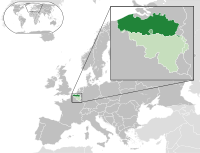Related Research Articles
Articles related to Belgium include:

The Vrije Universiteit Brussel is a Dutch and English-speaking research university in Brussels, Belgium. It has four campuses: Brussels Humanities, Science and Engineering Campus, Brussels Health Campus, Brussels Technology Campus and Brussels Photonics Campus.

The Free University of Brussels was a university in Brussels, Belgium. It existed between 1834 and 1969 when it split along linguistic lines.
The Katholieke Universiteit Brussel was a Flemish university located in Brussels, founded in 1969 as University Faculties St Aloysius (UFSAL), in many ways the equivalent of a liberal arts college. It split up from the primarily French-speaking Saint-Louis University, Brussels to become an independent Dutch-speaking institution. It became recognised as a university by the Flemish Community of Belgium in the early 1990s. It only ever awarded basic undergraduate degrees, which in the older Belgian system of a four-year licenciate meant students had to go on to other universities to complete their courses of study.
Hogeschool Sint-Lukas Brussel is an independent Flemish art school based in the Schaerbeek municipality of Brussels, Belgium. It is a predominantly Dutch-speaking institution located on the Paleizenstraat/Rue de Palais, and at another site, within reachable distance of Brussels' North Station.

The Flemish Diamond is the Flemish reference to a network of four metropolitan areas in Belgium, three of which are in the central provinces of Flanders, together with the Brussels-Capital Region. It consists of four agglomerations which form the four corners of an abstract diamond shape: Brussels, Ghent, Antwerp and Leuven.

Gent-Sint-Pieters railway station is the main railway station in Ghent, East Flanders, Belgium, and the fourth-busiest in Belgium and busiest in Flanders, with 17.65 million passengers a year. The station is operated by the National Railway Company of Belgium (NMBS/SNCB).

VIB is a research institute located in Flanders, Belgium. It was founded by the Flemish government in 1995, and became a full-fledged institute on 1 January 1996. The main objective of VIB is to strengthen the excellence of Flemish life sciences research and to turn the results into new economic growth. VIB spends almost 80% of its budget on research activities, while almost 12% is spent on technology transfer activities and stimulating the creation of new businesses, in addition VIB spends approximately 2% on socio-economic activities. VIB is member of EU-LIFE, an alliance of leading life sciences research centres in Europe.
The education in the Flemish Community covers the Dutch-speaking part of Belgium and consists of three networks (netten): government-provided education (gemeenschapsonderwijs), subsidized public schools and subsidized free schools.

Hogeschool-Universiteit Brussel was a Dutch language university founded in 2007. HUBrussel was the result of a merger between Brussels-based colleges European University College Brussels, Vlekho, HONIM and Catholic University of Brussels (KUBrussel).
Science and technology in Brussels, the central region of Belgium (Europe), is well developed with the presence of several universities and research institutes.

KU Leuven is a Catholic research university in the city of Leuven, Belgium. Founded in 1425, it is the oldest university in Belgium and the oldest university in the Low Countries.

The Catholic University of Leuven was one of Belgium's major universities. It split along linguistic lines after a period of civil unrest in 1967–68 commonly known as the Leuven Affair in French and Flemish Leuven, based on a contemporary slogan, in Dutch. The crisis shook Belgian politics and led to the fall of the government of Paul Vanden Boeynants. It marked an escalation of the linguistic tension in Belgium after World War II and had lasting consequences for other bilingual institutions in Belgium within higher education and politics alike. In 1970 the first of several state reforms occurred, marking the start of Belgium's transition to a federal state.

VIVES University of Applied Sciences is a University College in West Flanders. The name refers to the Spanish-Brussian humanist Juan Luis Vives. VIVES is the result of a merger between KATHO and KHBO in 2013.
References
- ↑ Webometrics Ranking of World Universities Cybermetrics Lab, Centro Superior de Investigaciones Científicas, Spain. Retrieved on January 16, 2007
- ↑ THES - QS World University Rankings 2007 QS Education Trust. Retrieved on January 16, 2007
